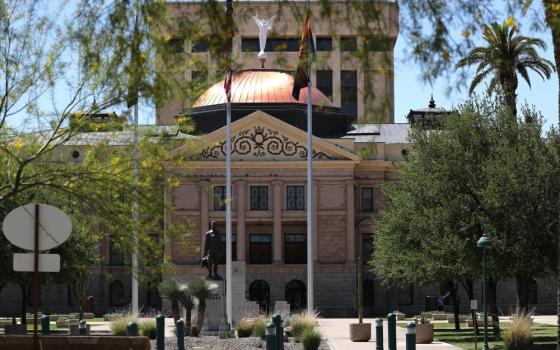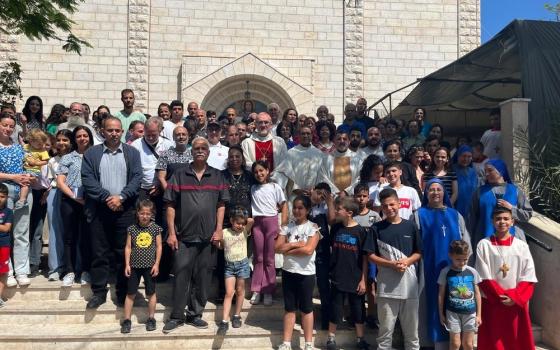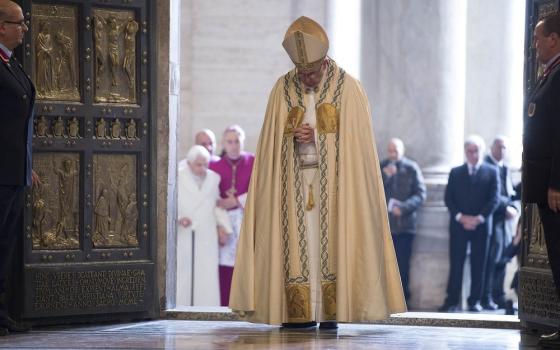Editorial
A way to make sense of the Vatican investigations of U.S. women religious is to concede that in the church of the 21st century we will still tolerate an exclusively male monarchy that operates by its own rules, believes itself accountable to virtually no one, understanding that it can act against groups and individuals with impunity and in secret.
It makes little sense to mature Christians today that women who have remained faithful to the church’s deepest mission, who are regularly working in places and among people where you will often find no one else willing to go, should have their motives questioned publicly and in a way that is an insult to their intelligence and their maturity.
Further, if there has been a definable, ongoing source of scandal to the church in recent years, it is within a hierarchy on several continents that has tolerated abuse of children and the rape of women religious by priests, and has protected the perpetrators of such deeds.
Women religious might not be entirely blameless in their conduct over, say, the past half century. But if one were to calculate the number of people who have left the church in recent years because of religious women and the number who have left because of the actions of bishops, the results would overwhelmingly point to the men as the source of greatest alienation and loss of faith.
Instead we find the men investigating the women.
U.S. women religious are in a difficult position. If they protest any aspect of this inquisition, if they share their hurt too loudly, if they resist these abusive procedures, if they fail to go along in every way, they will appear as if they’ve got something to hide, or as if they are simply the disobedient renegades the bishops seem to be suggesting they are.
On the other hand, if they say nothing and go along, if they enable the bullying behavior they are experiencing, then they are not serving the causes of either truth or justice. At best, they can argue that the indignities they face more clearly connect them to the suffering they see in the lives of the people they are continuing to serve. These are not just good women; they are holy women. We’ve heard them speak often of the role suffering can play in building both character and the reign of God.
We are proud of these good women. These Vatican investigations will distract from the pressing work of their ministries. We know some bishops have concerns, but wouldn’t it have been more open and honest if the bishops behind these investigations found ways to meet with the women and speak to them about their concerns? Does the church really benefit from bomb-dropping and stealth?
U.S. women religious are accountable to our bishops, and do not dispute this. But with ecclesial authority must also come ecclesial responsibility grounded in baptismal rights and human dignity.
As a group, our women religious took the call of the Second Vatican Council to heart with more enthusiasm and grace than any other element in the church. For most, it was a call to mercy and service and more often than not to the margins of the church where they have spoken up against personal and institutional injustices. If you want to define Christian commitment in our times, you don’t need to look beyond these women.
When the Leadership Conference of Women Religious met in New Orleans last month the first thing they did was visit the sites in that still hurting city where women religious are working -- with the assistance of some $7.2 million the conference has raised to continue their ministries -- helping the most needy and bringing the city back to life.
The Vatican investigations reveal a conflict between two models of church, a more traditional model and a more pastoral model, aimed at finding ways for the entire church to share more in leadership roles while working for greater justice and mercy in the church and world.
The women religious communities, with their more collective leadership models, as institutions represent perhaps the last remnant of the pastoral model, nurtured for years after Vatican II. It is painful for countless U.S. Catholics to see these women investigated.
The U.S. women religious are asking the Vatican what is really behind the investigations (see Page 12). They have a right to answers, as we all do.
What makes this especially painful, and doomed to failure from the start, is the fact that the women were not allowed in at the beginning. The women religious say that they have attempted over the years to be open to the Vatican, that their leaders have visited Rome annually and have met with Vatican officials, that they prize dialogue. So one can understand their surprise when, without warning, twin investigations of their communities and their leadership were sprung upon them (NCR, Aug. 21).
So we are all left wondering about the impetus and intent. What we have here are affronts to a way of being church, to a way of living as committed U.S. Catholics who prize due process and personal rights.
U.S. Catholics should speak up on behalf of the sisters. The Vatican has blundered in beginning these investigations. They are hurtful and a waste of time and energy. If any good can come from this it would be a surge in gratitude for the many gifts women religious have given to us over the decades.


